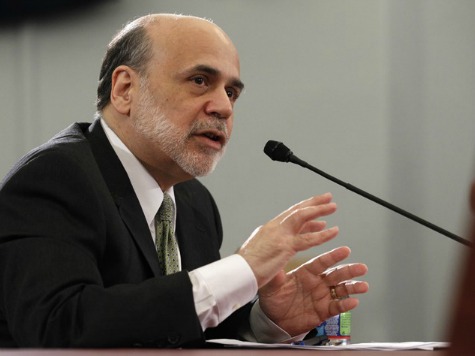
An eye-opening report contends that an 18-member group made up of the world’s most powerful central bankers–five of whom hail from the Massachusetts Institute of Technology (MIT)–conducts six meetings a year to fashion a “high-stakes experiment” to avert global economic collapse. Together, the central bankers’ countries produce $51 trillion worth of gross domestic product.
On Wednesday, the Wall Street Journal reported on the group, known formally as the Economic Consultative Committee. The “tightknit fraternity” assembles in Basel, Switzerland around a round table in a room with white walls, a black ceiling, and views looking over the Rhine. Staff are not permitted in the room and no minutes are recorded. Federal Reserve Chairman Ben Bernanke, who received his Ph.D. from MIT, is among the group’s membership.
Central banks have sent a tsunami of over $11 trillion gushing into the world financial system since 2007 as part of an experimental strategy based partly on economic theories cooked up at MIT:
Their monetary strategy isn’t found in standard textbooks. The central bankers are, in effect, conducting a high-stakes experiment, drawing in part on academic work by some of the men who studied and taught at the Massachusetts Institute of Technology in the 1970s and 1980s.
While many national governments, including the U.S., have failed to agree on fiscal policy–how best to balance tax revenues with spending during slow growth–the central bankers have forged their own path, independent of voters and politicians, bound by frequent conversations and relationships stretching back to university days.
The meetings, say insiders, are key. “That is where it really gets down and dirty,” said former Federal Reserve chief for international affairs Nathan Sheets, who has not attended the meetings but knows of them.
Group members say the meetings allow the powerful central bankers an opportunity to cross-pollinate ideas. “It is a way in which people can talk completely privately,” said former MIT professor and now Bank of England Governor Mervyn King. “It is a big advantage if you have some feel for how central banks think about questions, what they’re likely to do in the future if certain events were to occur.”
But economists like Harvard professor Kenneth Rogoff say only time will tell if the monetary path they’re pursuing leads to economic stability or ruin. “They are taking risks because it is an experimental strategy.”
The Economic Consultative Committee also allows its 18 members a way to quickly coordinate to make rapid-fire decisions. “A big secret of central bank cooperation is that you can just pick up a phone and have an agreement on something very quickly,” said Mr. King.
But with trillions of dollars under their control, minimal interference from politicians, and a turbulent global outlook, the question is whether the 18 central bankers know how to navigate today’s roiling, turbulent economic waters.
“We’re all very conscious that we’re in an environment that’s unusual and we’re using a policy weapon that we don’t have a lot of experience with,” said Deputy Governor of the Bank of England Charles Bean.
On Wednesday, Mr. Bernanke announced that the Federal Reserve will print money so it can buy $85 billion in bonds every month until unemployment drops to 6.5%.

COMMENTS
Please let us know if you're having issues with commenting.